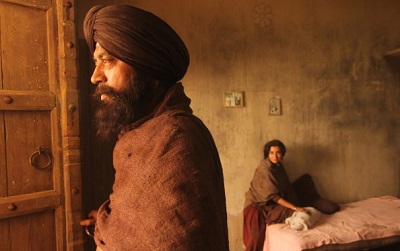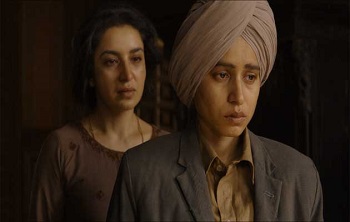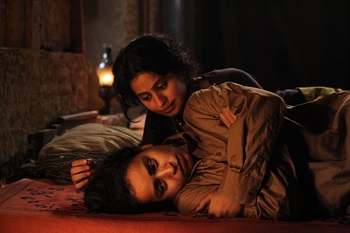
By Devapriya Sanyal.
Qissa (“fable”), Anup Singh’s second directorial venture (2013; released in India in 2015), deals with many issues at the same time, with all its characters equally important. But this film belongs to the Sikh Punjabi character Umber Singh (played by Irrfan Khan). Beginning in the present, the film visits the past through a long flashback and comes back exactly where the film begins. Umber Singh, as we learn, is a native of Panjab but with the Partition of 1947 his village simply ceases to be and comes to be occupied by Pakistan where the Sikhs and Hindus do not feel safe. Both groups decide to move east towards the newly created state of India. But before the journey, Umber Singh has to deal with the birth of his child: he eagerly awaits a boy, only to be told that it is a girl yet again. He firmly tells his wife that he’s seen enough girl children. He is bitter and in desperation takes his wife and girls away to leave behind everything that he has worked for in his life. He even poisons the well in his courtyard by dragging a murdered Pakistani and dropping the dead body into the well. Next, he breaks the shelves standing outside his home and locks the doors. He knows that he will never be able to visit it again.
When we see him next, he is in India where he narrates the story of having taken the better part of four years to set up his timber business where he is doing well, though his bitterness lingers. Incidentally, the narratorial voice belongs to him. His wife is expecting again, and Umber Singh tells his wife in a menacing tone that he knows this time it will be a boy.
While there have been some films revolving around partition, most of them heart rending, Qissa is comes with a twist. It moves way beyond the themes of partition to grapple with issues related to gender, identity, and self. The child is soon born, but before the mother or the audience can determine its gender it is snatched away by Umber Singh, swathed in clothes and pronounced as a son. We know something is wrong as his wife Meher, played by Tisca Chopra, cloud over in doubt and anxiety as she says half fearfully, “It were better to have killed the child.” But Umber Singh is jubilant; he has finally got his son, the prince of his dreams and even names it such: Kanwar (Panjabi for ‘prince’).
 Kanwar is literally his father’s son, brought up by his father and kept away from his mother and sisters. He is seen to indulge in all such activities that are male-oriented though we do find him a tad bit interested in womanly activities, too. What is interesting is that Anup Singh skillfully maintains the suspense. He portrays Kanwar at the age where it is difficult to distinguish whether the child is male or female in a Sikh household, since both are forbidden to cut their hair. Kanwar is also forbidden to cry as it is believed that men just don’t. He is being taught to invest in ideas that make him a man, or rather, masculine. Very soon, the father comes home one day with a guru who is to teach the young Kanwar the art of wrestling, so as to make him strong and therefore a complete man.
Kanwar is literally his father’s son, brought up by his father and kept away from his mother and sisters. He is seen to indulge in all such activities that are male-oriented though we do find him a tad bit interested in womanly activities, too. What is interesting is that Anup Singh skillfully maintains the suspense. He portrays Kanwar at the age where it is difficult to distinguish whether the child is male or female in a Sikh household, since both are forbidden to cut their hair. Kanwar is also forbidden to cry as it is believed that men just don’t. He is being taught to invest in ideas that make him a man, or rather, masculine. Very soon, the father comes home one day with a guru who is to teach the young Kanwar the art of wrestling, so as to make him strong and therefore a complete man.
Qissa is a powerfully haunting, well-crafted film about the fluidity of identity and sexuality not seen in India in a long, long time. We are asked what constitutes one’s identity. Does it stem from a culture or a place that one is born in? Is it just one’s gender, sexuality, or simply the environment in which ones is raised or the experiences that shapes oneself? These are some of the questions which the film tries to raise. Umber Singh, a patriarch dealing with the scars of the India-Pakistan separation which continually haunt him, raises his fourth girl child as a boy, unwilling to accept her as a girl, unwilling to make compromises this time, remembering only too well the last time he had had to make one, which uprooted him and his family from his native place. He also tries to cement his being though in a most unrealistic fashion.
While the audience might begin to think that Kanwar (in maturity played by Tillotama Shome) would at some point want to embrace her feminine traits, to either dress like a woman or act like one – especially after the death of her father and when she is about to begin a new life in her mother’s paternal home. But with the help of Neeli (Rasika Dugal), she is actually repulsed by the idea of being a woman, thanks to her father Umber Singh’s utmost denial of her sexuality at the cost of his compulsive desire for a son. Not feeling comfortable in a woman’s clothes either, she informs Neeli that she feels as if a thousand scorpions are all over her body while she is in women’s attire.
All the three women actors in Qissa, Tisca Chopra (the mother/wife Meher), Shome (the ‘son’) and Dugal (the ‘son’s’ lover/wife/friend) have pulled off complex roles with a great amount of sensitivity and understanding. Chopra is a helpless mother reduced to silence, while her youngest daughter, forced to playact the role of a man, is curious about her body in a silent way and yet drawing comparisons with hir sisters and Neeli, the young girl in love with Kanwar whom she thinks of as a great catch. Meanwhile Umber Singh silently witnesses it all and seals his son/daughter’s fate when he agrees to get her married to Neeli.
 Not very often do we have sensitive films on LGBT issues by Indian filmmakers; most of the scenes, though haunting, are crafted with passion and bear witness to Anup Singh’s uncompromising vision and decade-long commitment to bringing his script alive. Qissa could have been a fascinating tale but for an unusual second half where the director seems to lose his way in the mire of too many issues and complexities. He leaves some of the scenes too open for interpretation, choosing to employ magic realism in them, especially in the scene where Kanwar, having been discovered for who she is by the villagers, runs for her life and is apparently swallowed up by the soul of hir dead father.
Not very often do we have sensitive films on LGBT issues by Indian filmmakers; most of the scenes, though haunting, are crafted with passion and bear witness to Anup Singh’s uncompromising vision and decade-long commitment to bringing his script alive. Qissa could have been a fascinating tale but for an unusual second half where the director seems to lose his way in the mire of too many issues and complexities. He leaves some of the scenes too open for interpretation, choosing to employ magic realism in them, especially in the scene where Kanwar, having been discovered for who she is by the villagers, runs for her life and is apparently swallowed up by the soul of hir dead father.
Anup Singh’s film also tries to explore as to how much of a difference sexual body parts contribute to the makeup of a person’s psyche. Throughout the movie, Umber Singh utterly neglects questions related to Kanwar’s sexuality, which makes the woman inside Kanwar very lonely. Umber Singh even appears deranged at times, for at one point he promises to gift Neeli all the jewelry in a shop they visit, after her marriage to Kanwar and her discovery of his ‘impotency’, a tale Umber Singh concocts at the drop of a hat – if only she will gift the family an heir! Again, a male heir, of course. The woman Kanwar could have been but cannot be, ever, is not that different from the lonely ghost that longs to be seen or set free.
A lesbian romance between Kanwar and Neeli is only suggested, whether purposely so as to avoid controversies or as per the demands of the script one doesn’t know. One can only say that much could have been explored on that front and also made for a bold move. Qissa leaves one disturbed in bits and parts. Irrfan Khan is especially powerful in his depiction of the willful, selfish, but strangely lonely patriarch and lends to the film much of its magic and haunting quality.
Devapriya Sanyal has a Ph.D in English Literature from JNU, India. She is the author of From Text to Screen: Issues and Images in Schindler’s List. Her biography on Soumendu Roy, Satyajit Ray’s cinematographer, is forthcoming.
